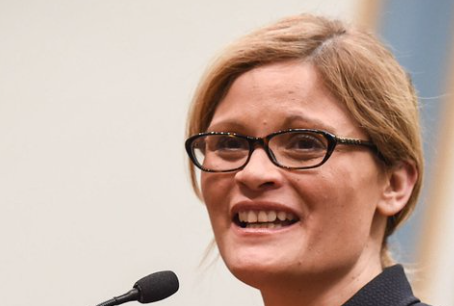
Natasha Alexenko (X screencap).
On August 6, 1993, a 20 year-old woman was raped and sodomized at gunpoint after midnight in an empty stairwell in Manhattan. She made the decision to go to a local hospital for forensic testing.
That woman was Natasha Alexenko, and her bravery was the first in a series of events that would lead to the incarceration of her attacker--albeit 13 years later.
Moreover, her actions fostered the creation of a new prosecutorial tool to catch rapists, a book she wrote about her ordeal, and the formation of a foundation that draws attention to the horrendous backlog of rape kit testing in the US.
Ms. Alexenko died at the age of 51 in West Islip on October 31 due to amytrophic lateral sclerosis and multiple sclerosis. She was survived by her husband, Scott Sessa, her mother, Nevart Mnatzaganian-Alexenko, and her sister, Kathryn Ansley.
The first step to catching a rapist is often overcoming the emotional and physical pain of the attack in order to seek medical attention, and then there's the matter of engaging with law enforcement to document the crime.
Too often, these crucial steps aren't taken by victims.
Canadian researchers looking at data from an Ottawa hospital found that less than two thirds of women who were eligible for a rape kit completed one and less than a third of those women released the results to the police, according to the study published in Emergency Medicine Journal.
"What can be inferred from our results is that a large number of women don't want to engage with the justice system," said the study's lead author Dr. Katherine Muldoon, a postdoctoral fellow at the Hospital Research Institute and the University of Ottawa.
The whole process can be daunting to a woman who has just been traumatized, Muldoon said. "The gynecological exam can be triggering if you've just gone through an assault," she explained. "And there's also the fear of engaging with the police afterwards."
Ms. Alexenko completed all of the necessary procedures, only to find years later that her rape kit sat untested for 9 years. It was then that she started to question the system. The results: national attention due to the involvement of Mariska Hargitay's sexual assault survivor advocacy foundation, and a new legal tool for prosecutors to indict unknown persons.
As reported in the New York Times:
But the kit was not tested until 2003, just as the 10-year statute of limitations for prosecuting her case was nearly up. (New York State abolished the statute for first-degree rape in 2006.) Ms. Alexenko discovered that she was not alone in losing the precious time available to have her attacker identified, arrested and tried. In the late 1990s, the Manhattan district attorney’s office estimated that 17,000 rape kits sat untested in a police warehouse in New York City. Thousands more had been left untested in crime laboratories nationwide, the result of tight budgets, overburdened crime labs and, some advocates said, a gender bias discounting sexual assaults against women.
“My rape kit was not just a number in a police department,” Ms. Alexenko said on End the Backlog, a website run by Joyful Heart Foundation, an advocacy group for survivors of sexual assault, domestic violence and child abuse founded by Mariska Hargitay, a star of “Law & Order: Special Victims Unit.”
She added: “My rape kit was me — a human being.”
Eventually, her attacker’s DNA was used to create a so-called John Doe indictment, which allows prosecutors to indict an unknown person. Four years later, Ms. Alexenko’s assailant, Victor Rondon, a career criminal, was arrested in Las Vegas for jaywalking and extradited to New York City for violating his parole. When the police swabbed his cheek for DNA, it matched the DNA in Ms. Alexenko’s rape kit.
“On Aug. 6, 2007, exactly 14 years to the day after I was raped, Victor Rondon’s name replaced the name ‘John Doe’ on my rape kit,” she wrote in her book.
In 2008, Rondon was found guilty on eight charges, and sentenced to 44 to 107 years in prison.
In 2011, Alexenko founded Natasha's Justice Project, a foundation to expose the widespread backlog of rape kit testing. Her work led to a 2019 law in California that expedites rape kit testing, a two grants: one in New York for $79 million, and another national Justice Dept. grant to address the backlog issue.
Suffice it to say, Alexenko's work has led to the incarceration of many rapists, thereby lowering recidivist crime, an honorable legacy indeed. God bless her, and may she rest in peace!